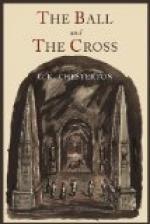And the morning after that, the editors and the newspapers were in such a state, that, as the phrase is, there was no holding them. Whatever secret and elvish thing it is that broods over editors and suddenly turns their brains, that thing had seized on the story of the broken glass and the duel in the garden. It became monstrous and omnipresent, as do in our time the unimportant doings of the sect of the Agapemonites, or as did at an earlier time the dreary dishonesties of the Rhodesian financiers. Questions were asked about it, and even answered, in the House of Commons. The Government was solemnly denounced in the papers for not having done something, nobody knew what, to prevent the window being broken. An enormous subscription was started to reimburse Mr. Gordon, the man who had been gagged in the shop. Mr. MacIan, one of the combatants, became for some mysterious reason, singly and hugely popular as a comic figure in the comic papers and on the stage of the music hall. He was always represented (in defiance of fact), with red whiskers, and a very red nose, and in full Highland costume. And a song, consisting of an unimaginable number of verses, in which his name was rhymed with flat iron, the British Lion, sly ’un, dandelion, Spion (With Kop in the next line), was sung to crowded houses every night. The papers developed a devouring thirst for the capture of the fugitives; and when they had not been caught for forty-eight hours, they suddenly turned the whole matter into a detective mystery. Letters under the heading, “Where are They,” poured in to every paper, with every conceivable kind of explanation, running them to earth in the Monument, the Twopenny Tube, Epping Forest, Westminster Abbey, rolled up in carpets at Shoolbreds, locked up in safes in Chancery Lane. Yes, the papers were very interesting, and Mr. Turnbull unrolled a whole bundle of them for the amusement of Mr. MacIan as they sat on a high common to the north of London, in the coming of the white dawn.
The darkness in the east had been broken with a bar of grey; the bar of grey was split with a sword of silver and morning lifted itself laboriously over London. From the spot where Turnbull and MacIan were sitting on one of the barren steeps behind Hampstead, they could see the whole of London shaping itself vaguely and largely in the grey and growing light, until the white sun stood over it and it lay at their feet, the splendid monstrosity that it is. Its bewildering squares and parallelograms were compact and perfect as a Chinese puzzle; an enormous hieroglyphic which man must decipher or die. There fell upon both of them, but upon Turnbull more than the other, because he know more what the scene signified, that quite indescribable sense as of a sublime and passionate and heart-moving futility, which is never evoked by deserts or dead men or men neglected and barbarous, which can only be invoked by the sight of the enormous genius of man applied to anything other than the best.




